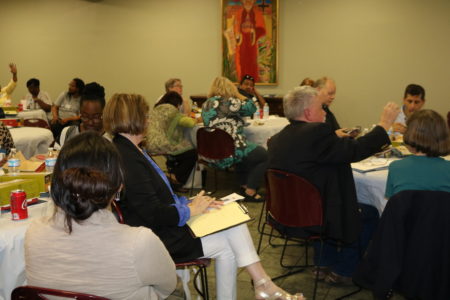By Maureen Smith
JACKSON – On Wednesday, May 23, community advocates, government agencies, religious leaders, legislative leaders and people who struggle every day with mental illness got together to talk about what Mississippi needs to do a better job of mental health care. The event was the delayed Catholic Day at the Capitol held at the Cathedral of St. Peter the Apostle. Bad weather in January forced the event into May.
About a hundred people attended the event to hear what has changed in mental health care, what some of the challenges are and where the state still has weaknesses in this area. Angela Ladner, executive director of the Mississippi Psychiatric Association kicked off the day by talking about the many facets of this complex issue. In her view, every member of the community has to be willing to join the conversation. “There are medical issues, genetic issues. We should not stigmatize that,” said Ladner.

JACKSON – Advocates filled the Cathedral Center for Catholic Charities’ Catholic Day at the Captiol Mental Health workshop Wednesday, May 23. (Photo by Maureen Smith)
Ladner is a proponent of community-based intervention and care. From the perspective of the psychiatric community, she believes that fast intervention in a crisis, followed by reintegration into the community with supportive services, is the best approach. In her perfect model for addressing people who have not gotten the preventive care they need, “if I go into crisis, somewhere from zero to 72 hours I can go to a single point of entry in my community.”
Those first three days are critical to a full recovery. “Medically, data shows after 72 hours your brain is damaged from that crisis. You are worse off than before,” she explained. If the patient can be stabilized at the crisis center within 72 hours he or she does not need to be committed. They can, in a perfect world, go back to their community and get follow-up care where they live to prevent a future crisis and address any ongoing mental health issues.
After Ladner’s presentation a panel of mental health workers and advocates gave their own presentations. James “Bo” Chastain, CEO of the Mississippi State Hospital in Whitfield gave a very detailed power point of the work the Department of Health has done to improve services, especially in light of a Department of Justice suit filed in August of 2016 claiming the state was violating the Americans with Disabilities Act and the Civil Rights of Institutionalized Persons Act. The suit claims the state is “failing to provide adults with mental illness with necessary integrated, community-based mental health services.” The DOJ said many people are forced into institutions instead of getting the help they need at home.
Chastain outlined expansions in community services including additional crisis stabilization units in all parts of the state, adding crisis therapists and adding mobile crisis response teams. Jake Hutchins, a bureau director for community mental health services in the state, said those units answered 20,000 calls in a year.
Beyond crisis care, Ladner, Chastain and Hutchins spoke about other community issues, such as finding stable housing sources and supportive employment for those with mental illness. The state has expanded services in both those areas, providing rental assistance and job placement and support as part of its three-year strategic plan to address Department of Justice concerns.
Perhaps the most emotional presentation came from Ramona Russum, a parent who has had to navigate the system on behalf of two children. “Living with someone with a mental illness or disorder is a challenge. Living with a child with a mental disorder is literally running from place to place putting out fires,” she said.
She said she has seen improvements in community-based care. When a child can be treated in his or her community, they can stay close to home and see their families instead of going to an institution far away. Russum credits community-based care with a huge improvement in her family situation in the past year.
Marvin Edwards is the prison ministry coordinator for the Diocese of Jackson. He spoke about how many inmates come to prison with mental illness and only get worse and worse while incarcerated. He said there is one psychiatrist for 19,000 inmates so the need for reform is pressing. Edwards believes many crimes could be prevented if young people could get help before they make a terrible decision.
Henry Moore from Families as Allies, an advocacy group for families with mental illness issues, said his organization is in the process of gathering data to show what treatments and styles of treatment work and what do not. “We are speaking to the families themselves. These are authentic voices,” he said.
Joy Hogge wrapped up the mental health portion of the day. She is the president of Families as Allies. She said while things are improving, there is still much work to be done to help the people in this state. “It is important to ask people with mental illness what they want,” she explained. Sometimes community leaders make decisions without seeking input from those directly affected. “It is good that we now have mobile response teams, but now we need to ask people how they worked for them,” said Hogge.
The day was organized by Catholic Charities’ office of parish social ministry and the Faith in Action Team.
